Muhyiddin Ibn ‘Arabi: The Treasure of Compassion
Stephen Hirtenstein
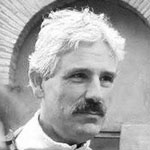
He read History at King’s College, Cambridge, and then studied at the Beshara School of Intensive Esoteric Education in Gloucestershire and Scotland. After a teaching career, he began writing and giving talks on Ibn Arabi’s thought at conferences across the world.
In addition to lecturing and writing, he organises and leads tours "in the footsteps of Ibn Arabi".
He currently works as a Senior Editor for the Institute of Ismaili Studies in London, and lives near Oxford.
Articles by Stephen Hirtenstein
The Image of Guidance – Sadr al-Din al-Qunawi as Hadith Commentator
“I entrust to you a bequest” – Ibn Sawdakin | Translation
Muhyiddin Ibn Arabi: The Treasure of Compassion
Selected Major Works of Ibn Arabi
Seleção das maiores obras de Ibn Arabi (Portuguese)
De Volta a Deus (Ibn Arabī 1182–1184) – Capítulo 5 de O Compassivo Ilimitado (Portuguese)
Some Preliminary Notes on al-Diwan al-kabir
The Brotherhood of Milk – Perspectives of Knowledge in the Adamic Clay
“O Marvel!” – A Paradigm Shift towards Integration
The Mystic’s Kaaba – The Cubic Wisdom of the Heart According to Ibn Arabi
Malatyan Soil, Akbarian Fruit: From Ibn Arabi to Nyazi Misri
Sadr al-Din al-Qunawi’s al-Nusus | with Hülya Küçük
Names and Titles of Ibn [al-]‘Arabi
Kitâb al-fâna' fi-l mushâhadah, by Ibn 'Arabi | with Layla Shamash
The Great Dīwān and its offspring: The collection and dispersion of Ibn 'Arabī's poetry | with Julian Cook
The library list of Ṣadr al-Dīn al-Qūnawī | with Julian Cook
Malik MS 4263: A Manuscript Case-study
Translations by Stephen Hirtenstein
Kitâb al-fâna’ fi-l mushâhadah by Ibn ‘Arabi
Podcasts and Videos by Stephen Hirtenstein
The Healer of Wounds: Interpreting Human Existence in the Light of Alchemy and Ascension
Reviving the Dead: Ibn Arabi as the Heir to Jesus
Introduction to the “Light & Knowledge” Conference
The Mystic’s Kaaba – The Wisdom of the Heart According to Ibn Arabi
“O Marvel!” – A Paradigm Shift towards Integration
Spiritual Life, Living Spirit – Ibn Arabi’s Meeting with Jesus and John
O Marvel! a garden amidst the flames.
My heart has become capable of every form:
it is a pasture for gazelles and a convent for Christian monks,
and a temple for idols and the pilgrim’s Kaa’ba,
and the tables of the Torah and the book of the Quran.
I follow the religion of Love: whatever way Love’s camels take,
that is my religion and my faith.
Tarjuman al-Ashwaq. Theosophical
Publishing House, 1911. Poem XI.
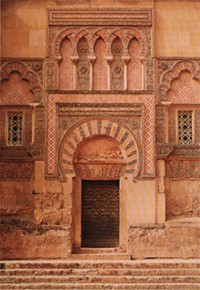
The doorway of the Great Mosque of Cordoba, where Ibn ‘Arabi would have gone to worship.
Muhammed Ibn ‘Ali Ibn ‘Arabi was born in Murcia in southern Spain in 1165 AD (560AH), at the time of the flowering of the Hispano-Arab culture. Since the invasion of the Iberian peninsula by the Moors in 711 AD, the southern half of Spain had been ‘arabised’ under Islamic rule, and Arabic became the common language of all educated people. Here in ‘al-Andalus’ the three major traditions of Judaism, Christianity and Islam flourished side by side in some measure of harmony, and there were many who regarded them as different roads to the same end. It was an immensely rich and talented world, as we can still see today in buildings like the Alhambra in Granada, or the Great Mosque at Cordoba; a world where the great classics of Greek literature, especially Aristotle and Plato, were translated (first into Arabic and then into Latin) and studied alongside the spiritual teachings of the three Abrahamic religions.
Ibn ‘Arabi grew up in an atmosphere steeped in the most important ideas – scientific, religious and philosophical – of his day. At a time when mass communication was non-existent, this was an essential ingredient in the formation of one of the most brilliant minds in the Western world. As the poem above demonstrates, Ibn ‘Arabi was not content with simply knowing about things, nor with following a particular way. Although many writers have characterised him as a great Sufi teacher firmly rooted in the Islamic world, it would be wrong to limit his appeal to a muslim audience or to see him simply as a great medieval thinker. His sole and overriding aim was to know reality as it is, in whatever way it is depicted. Naturally he expresses himself within the cultural context he knew, but he takes for granted that his readers will have the same unflinching, one-pointed attitude of passion for the truth, and his writings have a very contemporary ring. “All that is left to us by tradition”, he writes, “is mere words. It is up to us to find out what they mean”.
This passion manifested itself at a very early age. During his teens, like many adolescents before him and no doubt since, he used to divide his time between being a serious student – studying the Quran, Islamic law and so on – and having a good time with his friends. In the middle of one of these nightly parties in Seville he heard a voice calling to him, “O Muhammed, it was not for this that you were created”. In consternation he fled and went into retreat for several days in a cemetery. It was here that he had his seminal triple vision in which he met, and received instruction from, Jesus, Moses and Muhammed – an illumination that simultaneously started him upon the spiritual way and established him as a master of it. This vision took place in the mundus imaginalis, the imaginative presence where God reveals Himself directly to the spiritual aspirant; and throughout his life Ibn ‘Arabi was to receive many illuminations of this kind. From this initiating insight he embarked upon the journey of his life; a journey that would not only take him from one end of the Arab-speaking world to the other, but would also reveal the full intensity of the most remarkable spiritual life, which through his writings has affected, shaped, transformed all who come into contact with it.
Principle of Unity
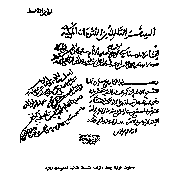
The first page of ‘The Futuhat al-Makkiyah’. Manuscript of Konya, handwritten by Ibn ‘Arabi.
It is difficult to convey anything but inklings of Ibn ‘Arabi’s teachings, since from whatever point of entry one begins, with whatever point of view one holds to be true, it is like stepping into an ocean. As in the case of Bach, even the quantity of his literary output is staggering – some 700 books, treatises and collections of poetry, of which perhaps 400 still survive (one, the ‘Futuhat al-Makkiyah’ (The Meccan Openings) is estimated to run to 17,000 pages in its new edition!). But the problem is not really the sheer volume of work, which would require a lifetime or more to study – it is the extraordinarily high quality of the material which makes tremendous demands upon the reader.
We are given a key to understanding, however, in the triple vision of the three great prophets of the Western world – for to Ibn ‘Arabi these three bring the same message, the same essential religion of love. He considers all prophets and saints to be explainers of this primordial religion:
There is no knowledge except that taken from God, for He alone is the Knower… the prophets, in spite of their great number and the long periods of time which separate them, had no disagreement in knowledge of God, since they took it from God.
Futuhat al Makkiyah II. 290
Trans. W. Chittick, ‘The Sufi Path of Knowledge‘.
Ibn ‘Arabi’s vision points precisely to this direct taking from God, in which there is unanimity across all traditions. In the West, this has sometimes been referred to as the Abrahamic tradition, since it is from the revelation given to the prophet Abraham that the three religions of the Western world flow. (Note: The family of Abraham is meant both historically and spiritually; the Prophet Muhammed said that he had come to purify the religion of Abraham, and Jesus said “Before Abraham was, I am”.). The cardinal point in the Abrahamic perspective is the meaning of monotheism, which has been much misunderstood and to which too little attention has been paid. In this tradition, God is not understood to be a Being, or even the Supreme Being above and beyond the universe, for both conceptions imply that there are other beings outside Him. What is meant by God is simply Being as such. This cannot ever become an object of knowledge or contemplation or thought; it can only be known as unknowable, but simultaneously it presents itself as both knower and known, contemplator and contemplated, lover and beloved. As Ibn ‘Arabi puts it:
… the existence attributed to the created thing is the Being of God, since the possible has no existence. However, the essences of the possible are receptacles for the manifestation of this Being… For the verifiers it has been established that there is nothing in Being but God.
Futuhat II. 69. Trans. W. Chittick.
Thus the fundamental ‘Semitic’ insight is that ultimately the ground of all things, in whatever sphere, is one; and ‘things’, be they the largest mass or the tiniest subatomic particle, are a perpetual state of becoming of that One. There is immediate contact between each thing and its reality, so that each receives Being according to its degree of preparedness; a bee, therefore, determines its own creation as a bee. This is not just an ontological fact, intellectually acceptable as a premise yet without application; there is also – and more importantly perhaps – common ground, in human experience, of discovering this to be true. Each and every life, whether consciously or not, is a voyage of discovery of what this unity of being really means.
The whole of the spiritual life begins, Ibn ‘Arabi would say, in the realisation of this fact, and ends in it. What lies between is the discovery of how this is so at every instant, in the intimate heart of each individual being. So the discovery of God is equally the ceaseless self-discovery of the individual. The world is no longer static, but the dynamic theatre of the Divine manifestation, and every movement in it is essentially a movement in love of God. It is simultaneously “He and not He”, as Ibn ‘Arabi says, just like the image of a person in a mirror. The particular quality that he often employs in his writings is that of the constant interplay of paradox, similar to the Zen koan, to force the mind to reach its limit so that the truth may be seen without limitation.
Philosophy and Insight
It is this paradox which is beautifully described in a meeting between Ibn ‘Arabi and the chief judge of Seville, the celebrated jurist and philosopher Ibn Rushd (known to the Latin West as Averroes, who wrote a famous commentary on Aristotle).
I spent the day in Cordoba at the house of Abu al-Walid Ibn Rushd. He had expressed a desire to meet me in person, since he had heard of certain revelations I had received while in retreat and had shown considerable astonishment concerning them. In consequence my father, who was one of his closest friends, took me with him on the pretext of business, in order to give Ibn Rushd the opportunity of making my acquaintance.
“I was at the time a beardless youth. As I entered the house, the philosopher rose to greet me with all the signs of friendliness and affection, and embraced me. Then he said to me “Yes”, and showed pleasure on seeing that I had understood him. I, on the other hand, being aware of the motive for his pleasure, replied “No”. Upon this Ibn Rushd drew back from me, his colour changed and he seemed to doubt what he had thought of me. He then put to me the following question, “What solution have you found as a result of mystical illumination and divine inspiration? Does it coincide with what is arrived at by speculative thought?” I replied “Yes and no. Between the Yea and the Nay the spirits take their flight beyond matter, and the necks detach themselves from their bodies.
At this Ibn Rushd became pale, and I saw him tremble as he muttered the formula ‘there is no power save from God’. This was because he understood my allusion… After that he sought from my father to meet me in order to present what he himself had understood: he wanted to know if it conformed with or was different from what I had. He was one of the great masters of reflection and rational consideration. He thanked God that in his own time he had seen someone who had entered into the retreat ignorant and had come out like this – without study, discussion, investigation or reading.
‘Sufis of Andalusia‘ transl. by R. W. J. Austin, 1971.
Reprint Beshara Publications, 1988. p23.
The difference between Ibn ‘Arabi and Ibn Rushd is not that between the unworldly, unlettered mystic and the erudite philosopher. Ibn ‘Arabi was neither unworldly nor unlettered in any orthodox sense. (Note: The real ‘unlettered’ person, Ibn ‘Arabi says, is someone who “does not use rational proofs to attain to the knowledge of divine things.” (Futuhat I. 644)). He was extremely well-versed in the philosophical thinking of his time, and many of his books deal quite specifically with philosophical problems. The real difference lies in the way in which knowledge is reached, whether by reflective thinking or by mystical insight. This is graphically depicted in a second meeting, this time in a vision which Ibn ‘Arabi had:
A thin veil separated me and him in such a way that I was able to see him while he was unable to see me and ignorant of my presence. He was so absorbed that he paid me no attention and I said to myself ‘He is not destined to follow the same path as me’.
Futuhat I. 154. Trans. C. Addas,
‘La Quete pour la Soufre Rouge‘.
Philosophical wisdom, it is implied, is based on reflection, and limited to the divided and personal realm of the ‘Yes’ and the ‘No’; whereas mystical wisdom is founded on direct experience – often referred to as ‘taste’ – and is as incontrovertible as the acts of sense perception. The reality of the ‘thin veil’ between the two is only seen from the side of the mystical contemplation, although the possibility can be admitted philosophically. But Ibn ‘Arabi would be the first to confirm that all human beings have this self-same capacity for mystical wisdom, just by the sheer fact of being human. It is not the privilege of a select few but open to all who choose it. What he strives for is the complete integration of the human being, with all his or her faculties, upon the task of fulfilling “that for which you were created”.
The Spiritual Path
As a young man Ibn ‘Arabi put himself under the direction of various spiritual masters, both in southern Spain and elsewhere, but always there was a slightly ambiguous relationship between master and pupil. In one way he was required to learn all he could from those whose experience of the spiritual path was greater; in another way, his innate spiritual understanding and ability to learn commanded tremendous respect. Among the many gnostics that he mentions in his book on the Sufis of Andalusia was a woman called Fatimah:
She lived in Seville. When I met her, she was in her nineties. Looking at her in a purely superficial way, one might have thought she was a simpleton, to which she would have replied that he who knows not his Lord is the real simpleton.
She used to say ‘Of those who come to see me, I admire none more than Ibn ‘Arabi’. When asked the reason for this, she replied ‘The rest of you come with part of yourselves, leaving the other part of you occupied with your other concerns, while Ibn ‘Arabi is a consolation to me, for he comes with all of himself. When he rises up, it is with all of himself, and when he sits it is with his whole self, leaving nothing of himself elsewhere. This is how it should be on the Way’
‘Sufis of Andalusia’, p143.
When reading this or other episodes of his life, one is immediately conscious that Ibn ‘Arabi is not simply tossing out an anecdote about his own experience, but exhorting others to learn from it.
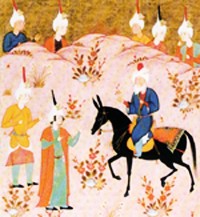
A late 16th Century Persian miniature, Safavid period, representing Ibn ‘Arabi on horseback with two students. Courtesy of the Bodleian Library, Oxford
By the time he left Spain in 1200 at the age of 35, never to return, Ibn ‘Arabi was already renowned as a spiritual master, and his knowledge and state were of an extremely high order. The Andalusia that he left behind was gradually engulfed by the Christian reconquista, and even today little is understood or appreciated of the achievements of Moorish Spain. The Middle East into which he now travelled was struggling to consolidate the apparent stability that Saladin had snatched out of the chaos of the Third Crusade. Egypt, Syria, Iraq and Palestine were united somewhat flimsily under one flag.
Ibn ‘Arabi made his way via Cairo and Jerusalem to Mecca, where he performed the pilgrimage in 1202. There he spent some two years in the company of the most influential and learned families in the city, studying and writing. It was here that he was inspired to compose his famous collection of poems, the ‘The Interpreter of Desires’ – love poems that give astonishing insight into the moods and conditions of the spiritual path. Many people were scandalised by their apparently erotic and sensuous imagery, and he was compelled to write a commentary on them in his own defence. It is fortunate for us that he did so, since his comments do much to illuminate the extraordinary depth of meaning that he brings to bear on poetic images.
Writings
Much of his time in Mecca must have been occupied in writing – several major works were completed, and a start was made upon the enormous encyclopaedia of esoteric knowledge, the ‘Futuhat al-Makkiyah’. Apparently while writing this he used to fill three notebooks a day, wherever he happened to be. This process must have gone on for the best part of 30 years, since the first edition or redaction was not finished until 1231. It is interesting that all his work seems to have sprung from the same maturity of vision. There is no sense of progression in understanding from one work to the next, simply a shift of focus according to the nature of the topic and the audience. His works therefore have the rich flavours of a master chef displaying the full range of tastes in his kitchen. This may in part be explained by the manner in which he wrote. As he himself describes:
In what I have written, I have never had a set purpose, as other writers. Flashes of divine inspiration used to come upon me and almost overwhelm me, so that I could only put them from my mind by committing to paper what they revealed to me. If my works evince any form of composition, that form was unintentional. Some works I wrote at the command of God, sent to me in sleep or through a mystical revelation… My heart clings to the door of the Divine Presence, waiting mindfully for what comes when the door is opened. My heart is poor and needy, empty of every knowledge. When something appears to the heart from behind that curtain, the heart hurries to obey and sets it down in keeping with the prescribed limits.
‘Sufis of Andalusia‘, p48.
And Futuhat I. 59. (Trans. Chittick)
Nowhere is this principle more evident than in the ‘Fusus al-Hikam’ (Wisdom of the Prophets) which, though relatively short, has been called by one modern scholar ‘the spiritual testament of the master’. It is an extended meditation upon the meaning of the major prophets as portrayed in the Quran. Ibn ‘Arabi tells us in the introduction that he received the whole bo ok in a veridic dream from the Prophet Muhammed, who told him “This is the book of the Fusus al-Hikam; take it and bring it out to the people who will benefit by it”.
If the 560 chapters of the ‘Futuhat’ can be compared to an encyclopaedia, which details every aspect of the spiritual life – the meaning of Islam, events in the life of the Prophet, the Quran and Hadith, principles of jurisprudence, the constitution of the human being, the path by which human perfection may be realised, cosmology, the role of political institutions, etc, etc – then the ‘Fusus’ can be seen as a single world map of Divine Wisdom, where each prophetic country is displayed in its global setting. Obviously the book treats of the Semitic heritage from Adam (who is considered in Islamic esotericism as the prototype of the human being) to Muhammed, without venturing into the teachings of the Far East. Here there is certainly a rich area of study for future generations, to see what Ibn ‘Arabi has to offer in terms of the wider ecumenism of world spirituality.
Influence
The ‘Fusus al-Hikam’ in particular played a central role in the succeeding Islamic tradition, and inspired several commentaries which are classics of mystical literature in their own right. Through his stepson and disciple, Sadruddin Konevi, his teachings flowed into Eastern Sufism, notably to Fakhruddin ‘Iraqi, Jelaluddin Rumi and Abdul Karim al-Jili. According to some scholars, much of Dante Alighieri’s writing was influenced by Ibn ‘Arabi’s exposition of the spiritual quest, whilst in recent times, with the advent of several translations, his work has begun to be read more widely in the West. As Dr Austin of Durham University, a student and translator of Ibn ‘Arabi’s works, has put it:
“Ibn ‘Arabi gave expression to the teachings and insights of the generations of Sufis who preceded him, recording for the first time, systematically and in detail, the vast fund of Sufi experience and oral tradition, by drawing on a treasury of technical terms and symbols greatly enriched by centuries of intercourse between the Muslim and Neo-Hellenistic worlds… all who came after him received it through the filter of his synthetic expression.”
‘Sufis of Andalusia‘, p48.
The fact that his work is situated on such a universal level is especially relevant in our own time where there is, on the one hand, a great danger of ‘throwing the baby out with the bath water’, of abandoning all religious tradition and practice in the striving for an understanding appropriate to the modern world; while on the other hand there is a tendency to remain in the bath for too long, in the apparent security of a form or belief. “The man of wisdom,” Ibn ‘Arabi reminds us, “will never allow himself to be caught up in any one form or belief, because he is wise unto himself”. (From ‘The Kernel of the Kernel’, Beshara Publications.)
Later Years
Having travelled extensively for nearly twenty years, visiting Jerusalem, Baghdad, Konya, Aleppo, Ibn ‘Arabi finally settled in Damascus in 1223 and made it his home for the last 17 years of his life. His influence and fame had spread far and wide throughout the Arab world, and he was named as the Shaykh al-Akbar, the Greatest Master. His students included people from all walks of life, including kings and beggars. One particular man lived in Egypt, but found the conditions there unbearable, so he walked all the way to Damascus, a distance of some 500 miles. When he arrived, he was addressed by the Shaykh with the following poem:
There are places which offer but scant consolation while others offer one great delight. However, make the Lord the mainstay and refuge of your soul, wherever and however you may be.
An unpublished poem from Ibn ‘Arabi’s ‘Diwan‘,
courtesy of Dr Austin.
Ibn ‘Arabi was by no means afraid to get involved in the social and political life around him. Not all was plain sailing, however, as he often came into conflict with the religious authorities and once was even forced to leave Egypt to avoid accusations of heresy and possible execution. Indeed this attitude has lasted until our own time as well – the Egyptian government banned his works in the 1970s, and in many Islamic countries they remain quite inaccessible. But in his own day he formed good and influential relationships with several notable rulers. One of them, Zahir the king of Aleppo, had wanted to execute a man of his court for revealing a state secret, and when Ibn ‘Arabi heard about it, he said to the king: “You imagine you have the dignity of kingship and that you are a Sultan! By God, I know of no sin in the world which is too much for me to forgive, and I am only one of your subjects. How is it then that you cannot bring yourself to forgive a crime which is no transgression according to God’s Law? Indeed your kingly magnaminity is meagre indeed”. At this the king was overcome with shame and set the man free.
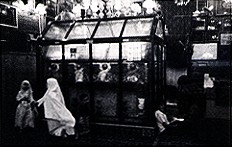
The tomb of Ibn ‘Arabi, as it is today, in Damascus
Ibn ‘Arabi died in Damascus on November 16th 1240 AD (638AH), aged seventy-six. His vast achievement has had enormous repercussions throughout the Islamic world and beyond. It would belittle his greatness to limit his message to Muslims in any strict sense, unless we were to take the word Muslim in its literal meaning – as Ibn ‘Arabi so often encourages us to do – ie. those who have surrendered their will to the will of God. The universal character of his teachings makes them superlatively appropriate to the present day. As one eminent professor of semitic studies remarked to me recently, after reading Ibn ‘Arabi you read the Greeks differently. One might add without fear of exaggeration that for any sincere seeker after truth, after you read Ibn ‘Arabi you read all things differently. The religion of Love that he so ardently professes is founded on reason, but it is not just a brilliant metaphysical exposition, as some people have characterised it, nor a theory to rival or supersede other theories. It is, for Ibn ‘Arabi, the essential human birthright and prerogative, and his whole life was dedicated to the verification and explanation of what it means to be truly human. In his own words:
God appeared to me in the inmost heart of my being and said to me “Make known to My servants that which you have verified of My generosity… Why do My servants despair of My Mercy when My Mercy embraces everything?
Futuhat I. 709. Trans. Addas, as above
This article first appeared in Beshara Magazine, Issue 12, Autumn 1990.
